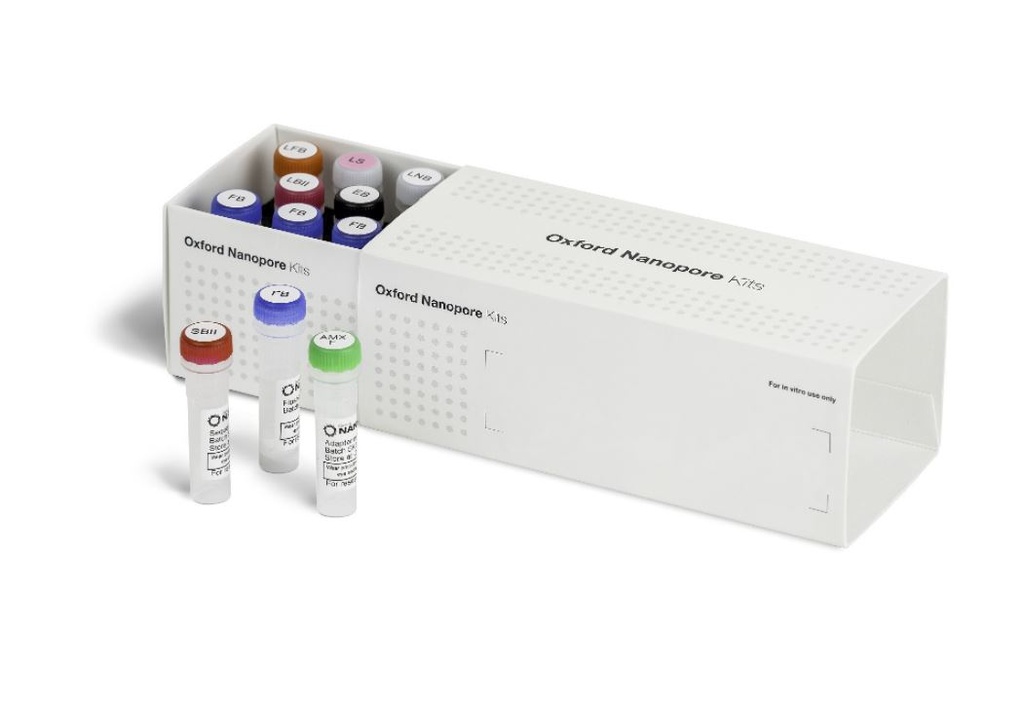ONT Rapid Barcoding Kit, 3 x 96 reactions
Catalog No :
CAS Number :
Brand :
In Stock
Simple and rapid library preparation, with barcoding for up to 96 gDNA samples.
Specifications:
| Application | Next Generation Sequencing |
| Storage Temperature | -20°C |
| Product Type | Sequencing Reagents |
| Product Brand | Oxford Nanopore Technology |
| Product Grade | Molecular Biology |
The Rapid Sequencing Kits and Rapid Barcoding Kits V14 from Oxford Nanopore Technologies provide a quick and efficient method to prepare sequencing libraries from genomic DNA (gDNA). These kits are specifically designed for use on ONT devices such as MinION™, and they streamline workflows for sequencing native DNA while preserving base modifications.
Key Features
1. Rapid Sequencing of Native DNA
- Preserves Native Characteristics:
- No PCR amplification required, eliminating PCR-induced bias.
- Enables detection of base modifications (e.g., methylation) alongside the nucleotide sequence.
- Speed and Simplicity:
- Library preparation in as little as 10 minutes for singleplex Rapid Sequencing Kits.
- ~60 minutes for multiplex workflows using Rapid Barcoding Kits.
- Minimal Equipment:
- Simplified process requiring basic laboratory equipment.
2. Multiplexing with Rapid Barcoding Kits
- Multiplex Up to 96 Samples:
- Attach barcoded tags to template DNA to pool samples in a single sequencing run.
- Useful for cases where individual sample data requirements are lower than the capacity of a flow cell.
- Efficient Use of Resources:
- Reduces cost per sample and maximizes sequencing throughput by pooling multiple samples.
- Compatible Kits:
- Rapid Barcoding Kit 24: For multiplexing up to 12 samples.
- Rapid Barcoding Kit 96: For multiplexing up to 96 samples.
3. Workflow
- Fragmentation and Tagging:
- A transposase cleaves the DNA and simultaneously attaches tags to the cleaved ends.
- Adapter Ligation:
- Rapid Sequencing Adapters are ligated to the tagged DNA ends.
- Barcoding (for Rapid Barcoding Kits):
- Unique barcodes are attached to the DNA ends, allowing multiple samples to be pooled.
- Pooling and Sequencing:
- Pooled samples are loaded onto ONT flow cells for sequencing.
- Barcoded reads are classified and sorted using MinKNOW software.
4. High Accuracy and Performance
- Chemistry Upgrade:
- V14 chemistry is optimized for speed and simplicity, delivering improved accuracy and higher output with R10.4.1 Flow Cells.
- Q20+ Accuracy:
- Capable of generating modal raw read accuracies of Q20+ (≥99%).
- Long Reads:
- Long DNA fragments in the sample allow the generation of very long reads, despite transposase-induced fragmentation.
Kit Specifications
| Feature | Rapid Sequencing Kit | Rapid Barcoding Kits V14 |
|---|---|---|
| Preparation Time | 10 minutes | ~60 minutes |
| Multiplexing | Single sample | Up to 96 samples |
| Input Requirement | 100 ng gDNA per sample | 50 ng gDNA per sample |
| PCR Requirement | None | None |
| Workflow | Fragmentation, tagging, adapter ligation | Same, with barcoding step |
| Sequencing Accuracy | Q20+ (≥99%) | Q20+ (≥99%) |
| Applications | Single sample sequencing | Multiplex sequencing |
Compatibility
- Devices: MinION™, GridION™, and PromethION™.
- Flow Cells: R10.4.1 flow cells.
Applications
- Whole-genome sequencing.
- Epigenetic studies (e.g., methylation detection).
- Pathogen surveillance.
- Large-scale genomic studies with multiplexed samples.
Advantages
- Time-Efficient:
- Drastically reduces library preparation time compared to traditional methods.
- Cost-Effective:
- Multiplexing reduces cost per sample.
- PCR-Free:
- Retains DNA base modifications and eliminates amplification biases.
- High Throughput:
- Compatible with ONT devices for large-scale sequencing.
Shipping and Storage
- Shipped at 2–8°C.
- Store at -20°C upon receipt.
- Shelf life: 3 months from delivery.
Safety and Legal Note
- Not intended for health assessment, disease diagnosis, or treatment purposes.
The ONT Rapid Sequencing and Rapid Barcoding Kits V14 provide a user-friendly, efficient, and accurate approach to sequencing, catering to both small-scale and large-scale genomic studies. Their fast preparation time, multiplexing capabilities, and PCR-free workflows make them invaluable for modern sequencing applications.




 0
0
